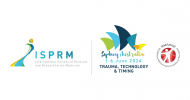Session outline
Rehabilitation Medicine, a dynamic and rapidly evolving field, requires a comprehensive and collaborative approach to patient care. As the demands on healthcare systems increase and patient needs become more complex, the role of mentors in shaping the future of rehabilitation medicine is more crucial than ever. This proposed scientific session aims to explore the significance of mentorship in equipping residents with the knowledge, skills, and insights needed to excel in their careers.
Mentorship transcends geographical boundaries, and this session will bring together experts and practitioners from various corners of the globe to share their perspectives and experiences. From North America to Europe, Asia to Africa, and beyond, we will delve into the unique challenges and opportunities that mentorship presents in diverse cultural and healthcare contexts.
Why is mentorship in rehabilitation medicine so vital? Mentors serve as guides, imparting not only clinical knowledge but also the art of patient-centered care, ethical decision-making, and leadership skills. They bridge the gap between textbook learning and real-world practice, offering invaluable insights into the intricacies of this multifaceted field. Furthermore, mentors inspire and empower the next generation of rehabilitation medicine professionals, fostering a culture of continuous learning and innovation.
This session will cover a range of topics, including:
- The Role of Mentors: Exploring the multifaceted roles mentors play in shaping the careers of rehabilitation medicine residents.
- Cultural Perspectives: Understanding how mentorship is perceived and practiced in different regions, and the impact of cultural nuances on the mentorship dynamic.
- Global Best Practices: Sharing success stories and best practices in mentorship programs from around the world.
- Mentorship in Research: Discussing how mentorship contributes to advancing research and evidence-based practices in rehabilitation medicine.
- Building Strong Mentor-Mentee Relationships: Practical strategies for both mentors and mentees to foster effective and mutually beneficial partnerships.
By attending this session, participants will gain a deeper appreciation for the pivotal role mentors play in the education and professional development of rehabilitation medicine residents. They will leave with actionable insights and strategies to enhance mentorship programs in their own institutions, ultimately elevating the quality of patient care in rehabilitation medicine worldwide.
By attending this session, participants will gain a deeper appreciation for the pivotal role mentors play in the education and professional development of rehabilitation medicine residents. They will leave with actionable insights and strategies to enhance mentorship programs in their own institutions, ultimately elevating the quality of patient care in rehabilitation medicine worldwide.
Learning outcomes
By the end of this session, participants will be able to:
- Understand the Multifaceted Roles of Mentors: Describe the diverse roles mentors play in shaping the careers and professional development of rehabilitation medicine residents.
- Appreciate Cultural Perspectives on Mentorship: Recognize the cultural nuances that influence how mentorship is perceived and practiced in different regions, and how these nuances impact mentorship dynamics.
- Identify Global Best Practices: Summarize success stories and best practices in mentorship programs from around the world, with an emphasis on key elements that contribute to their success.
- Apply Practical Strategies for Mentorship: Discuss practical strategies for both mentors and mentees to establish and maintain effective, mutually beneficial mentorship relationships.
- Enhance Mentorship Programs: Evaluate the session’s insights and consider implementing improvements or enhancements to mentorship programs within their own institutions or organizations.
- Foster a Culture of Continuous Learning: Recognize the importance of mentorship in fostering a culture of continuous learning and professional growth in the field of rehabilitation medicine.
- Network and Connect: Establish connections with panellists, fellow attendees, and potential mentors or mentees, creating opportunities for future collaborations and mentorship relationships.
Target audience
- Trainees
- Students
- Rehabilitation Medicine Physicians (PRM specialist)
- Allied health professionals
- Medical practitioners
- Nursing staff



